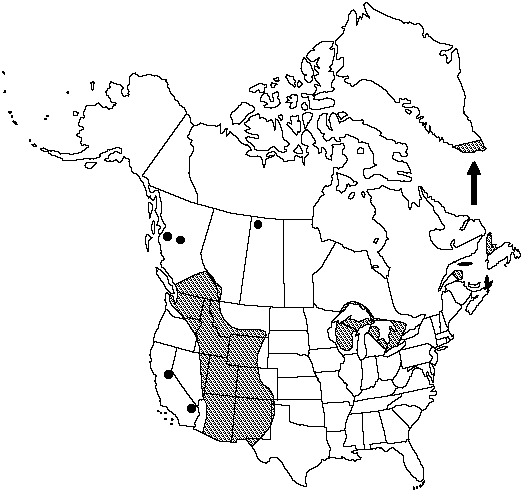Dryopteris filix-mas
Gen. Fil. plate 67. 1834.
Leaves monomorphic, dying back in winter, 28–120 × 10–30 cm. Petiole less than 1/4 length of leaf, scaly at least at base; scales scattered, brown, of 2 distinct kinds, 1 broad, 1 hairlike (only this species has 2 distinct forms of scales without intermediates). Blade green, ovatelanceolate, pinnate-pinnatifid to 2-pinnate at base, firm but not leathery, not glandular. Pinnae ± in plane of blade, lanceolate; basal pinnae ovatelanceolate, much reduced, basal pinnules or segments ± same length as adjacent pinnules, basal basiscopic pinnule and basal acroscopic pinnule equal; pinnule margins serrate to lobed. Sori midway between midvein and margin of segments. Indusia lacking glands. 2n = 164.
Habitat: Dense woods and talus slopes on limestone (ne North America), open woods among boulders and talus of granite or igneous rock (Rocky Mountains)
Elevation: 200–2500 m
Distribution

Greenland, Alta., B.C., Nfld. and Labr. (Nfld.), N.S., Ont., Que., Sask., Ariz., Calif., Colo., Idaho, Mich., Mont., N.Mex., Nev., Okla., Oreg., Tex., Utah, Wash., Wis., Wyo., Europe, Asia
Discussion
The taxonomy of Dryopteris filix-mas is not well understood. In North America, this fern has been considered both an auto- and an allopolyploid and may be composed of at least two closely related taxa. Plants in the northeast and northwest are tetraploid. These differ morphologically and ecologically from a taxon of unknown chromosome number in the southwestern Rocky Mountains. The Rocky Mountain taxon closely resembles the Mexican D. pseudofilix-mas (Fée) Rothmaler. Dryopteris filix-mas also occurs in Europe, and it is known to be an allopolyploid of D. caucasica (A. Braun) Fraser-Jenkins & Corley × oreades Fomin.
Selected References
None.
Lower Taxa
"not" is not a number. "swollen" is not a number."lengthofleaf" is not declared as a valid unit of measurement for this property."adjacent" is not a number. "adjacent" is not a number.